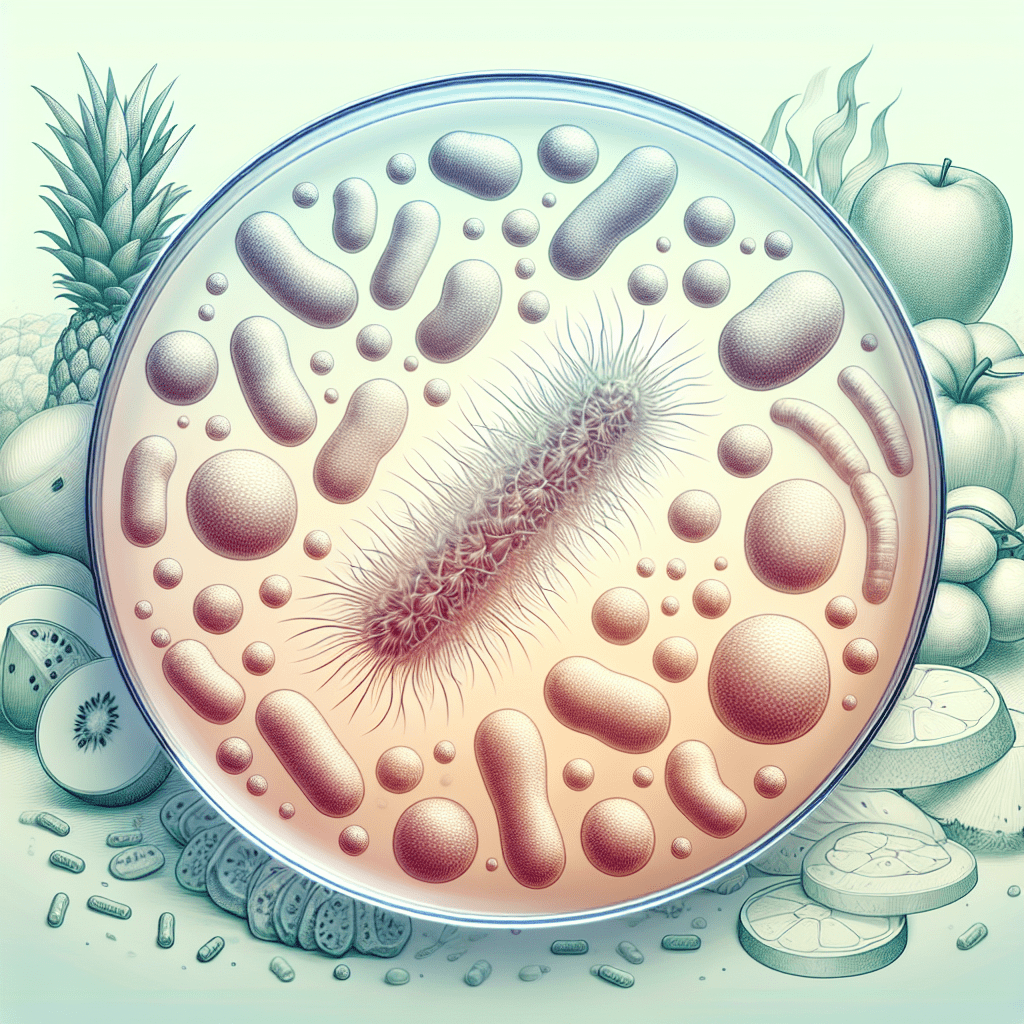
Faecalibacterium prausnitzii: The Microbe That Could Change Your Diet
Discover Faecalibacterium prausnitzii, the gut microbe shaping the future of health and nutrition. Learn how this powerful probiotic influences digestion, immunity, and even mental well-being—plus, find out how to boost it naturally through diet. A must-read for anyone interested in microbiome science!
Faecalibacterium prausnitzii: The Microbe That Could Revolutionize Gut Health Understanding
Nestled deep within the intricate landscape of our human intestine, a tiny bacterial superhero is quietly revolutionizing our understanding of gut health. Faecalibacterium prausnitzii, often overlooked but immensely powerful, represents a fascinating microbial marvel that could potentially transform how we approach digestive wellness and chronic inflammation management.
Recent scientific publications have shed remarkable light on this extraordinary probiotic bacteria. A groundbreaking study published in Nature Communications revealed that F. prausnitzii isn't just another microorganism – it's a critical player in maintaining gut flora balance and supporting overall intestinal health. Researchers have discovered its unique ability to produce butyrate, a short-chain fatty acid crucial for protecting the intestinal barrier function and modulating immune responses.
The significance of Faecalibacterium prausnitzii extends far beyond typical beneficial bacteria. Its remarkable anti-inflammatory properties have caught the attention of microbiome researchers worldwide, particularly in the context of managing complex conditions like inflammatory bowel disease and Crohn's disease. Clinical investigations suggest that lower abundance of this bacterial strain correlates with increased inflammatory markers, highlighting its potential as a key diagnostic and therapeutic target.
"Understanding F. prausnitzii is like discovering a microscopic guardian of our internal ecosystem" - Microbiome Research Quarterly
What makes this microbe truly extraordinary is its intricate relationship with our dietary habits and overall microbiota diversity. Its presence and proliferation can be significantly influenced by nutrition, prebiotics, and lifestyle factors – a testament to the dynamic nature of our gut microbiome.
What is Faecalibacterium prausnitzii?
Faecalibacterium prausnitzii is a fascinating anaerobic bacterium that belongs to the Firmicutes phylum and plays a pivotal role in human gut microbiota. Often referred to as an "anti-inflammatory bacteria," this microorganism is predominantly found in the human intestine, where it performs several critical functions essential for maintaining optimal gut health.
Microbial Classification and Characteristics
As a gram-positive, non-motile bacterium, F. prausnitzii stands out among the colon microbiota for its unique metabolic capabilities. It is classified as a commensal organism, meaning it maintains a symbiotic relationship with its human host, providing numerous health benefits without causing harm.
Metabolic Superpowers: Butyrate Production
- Specializes in producing short-chain fatty acids, particularly butyrate
- Butyrate serves as a primary energy source for colonocytes
- Plays a crucial role in maintaining intestinal barrier function
- Helps regulate inflammatory responses in the gut
Scientific Significance
Researchers have discovered that F. prausnitzii represents approximately 5-15% of the total bacterial population in a healthy human gut. Its abundance is considered a key indicator of intestinal health, with lower levels potentially signaling dysbiosis or increased risk of inflammatory conditions.
"F. prausnitzii is not just a bacterial strain; it's a microscopic guardian of our digestive ecosystem." - International Microbiome Research Network
Potential Health Implications
Emerging scientific research suggests that Faecalibacterium prausnitzii might play a significant role in managing and potentially preventing various health conditions, including:
- Inflammatory Bowel Disease (IBD)
- Crohn's Disease
- Ulcerative Colitis
- Metabolic disorders
- Immune system modulation
The intricate relationship between this bacterial strain and human health continues to fascinate microbiome researchers, promising exciting developments in preventive healthcare and personalized nutrition strategies.
The Anti-Inflammatory Powerhouse
Within the complex universe of gut microbiota, Faecalibacterium prausnitzii emerges as a true anti-inflammatory champion, wielding remarkable capabilities that extend far beyond typical probiotic bacteria. Its extraordinary potential to combat chronic inflammation makes it a microscopic superhero in the realm of gut health.
The Inflammation-Fighting Mechanism
At the core of F. prausnitzii's anti-inflammatory prowess lies its unique ability to produce butyrate, a short-chain fatty acid with profound immunomodulatory properties. This metabolic marvel doesn't just sit passively in the human intestine; it actively works to:
- Suppress pro-inflammatory cytokine production
- Enhance mucosal immunity
- Protect the intestinal barrier function
- Regulate immune system responses
Scientific Evidence: Beyond Speculation
Groundbreaking research published in the Journal of Crohn's and Colitis has demonstrated that individuals with lower F. prausnitzii abundance often exhibit heightened inflammatory markers. This correlation suggests that this bacterial strain isn't just beneficial—it's potentially crucial in managing chronic inflammatory conditions.
"The presence of Faecalibacterium prausnitzii could be a critical biomarker for intestinal health and inflammatory status." - International Microbiome Research Consortium
Clinical Implications
The anti-inflammatory potential of F. prausnitzii extends to several significant health domains, including:
- Inflammatory Bowel Disease (IBD) Management: Studies indicate potential therapeutic applications in reducing disease progression
- Metabolic Health: Potential role in mitigating systemic inflammation associated with metabolic disorders
- Immune System Modulation: Helping balance inflammatory and anti-inflammatory responses
What makes this bacterial strain truly fascinating is its dynamic interaction with our diet and lifestyle. Nutrition plays a pivotal role in stimulating F. prausnitzii growth, highlighting the intricate relationship between our dietary choices and gut microbiota composition.
By understanding and potentially nurturing this remarkable microorganism, we might be unlocking a new frontier in preventive healthcare—one microscopic bacterial strain at a time.
Microbiota Diversity and F. prausnitzii
In the intricate world of gut microbiota, diversity isn't just a buzzword—it's a critical marker of overall intestinal health. Faecalibacterium prausnitzii plays a pivotal role in maintaining this delicate microbial ecosystem, serving as a key indicator of a robust and balanced gut flora.
The Significance of Microbial Diversity
Research consistently demonstrates that a diverse microbiome is synonymous with better health outcomes. F. prausnitzii isn't just another bacterial strain; it's a cornerstone of this microbial complexity, representing a crucial component of a healthy intestinal environment.
- Typically comprises 5-15% of total gut bacterial population
- Acts as a key biomarker for microbiota health
- Contributes to overall microbial stability and resilience
Factors Influencing F. prausnitzii Abundance
Multiple scientific studies have identified key factors that can significantly impact the presence and proliferation of this beneficial bacteria:
- Dietary Patterns: High-fiber, plant-based diets promote F. prausnitzii growth
- Lifestyle Factors: Stress, sleep, and physical activity influence microbial diversity
- Prebiotic Consumption: Specific nutrients can stimulate bacterial growth
"Microbial diversity is not just about numbers, but about the intricate interactions between different bacterial strains." - Microbiome Research Institute
Clinical Implications of Reduced Diversity
Decreased abundance of F. prausnitzii has been linked to various health challenges, including:
- Increased risk of inflammatory conditions
- Compromised intestinal barrier function
- Potential metabolic dysregulation
- Altered immune system responses
Emerging research suggests that targeted interventions—through diet, probiotics, and lifestyle modifications—can potentially enhance F. prausnitzii populations and, consequently, improve overall gut microbiota diversity.
The story of F. prausnitzii is a testament to the complex, interconnected nature of our internal ecosystem. It reminds us that health is not about eliminating bacteria, but about cultivating a rich, balanced microbial landscape.
Dietary Influences on F. prausnitzii Growth
Understanding how dietary choices influence the growth and abundance of Faecalibacterium prausnitzii reveals a fascinating interplay between nutrition and our gut microbiome. What we eat doesn't just nourish us—it directly impacts the thriving microbial ecosystem within our intestines.
Nutritional Catalysts for F. prausnitzii
Scientific research has uncovered several key dietary components that can significantly promote the growth of this beneficial bacteria:
- Fiber-Rich Foods: Particularly complex, non-digestible carbohydrates that serve as prebiotics
- Plant-Based Diets: Mediterranean and vegetarian dietary patterns show positive correlations
- Fermentable Substrates: Compounds that support anaerobic bacterial metabolism
Dietary Powerhouses for F. prausnitzii Cultivation
Specific food groups have emerged as nutritional superstars in supporting F. prausnitzii populations:
- Whole Grains: Oats, barley, and quinoa provide complex carbohydrates
- Legumes: Beans, lentils, and chickpeas offer rich prebiotic fibers
- Vegetables: Particularly those high in inulin and oligofructose
- Fermented Foods: Kimchi, kefir, and other probiotic-rich options
"Your diet is a conversation with your microbiome, and F. prausnitzii is listening intently." - Gut Microbiome Research Quarterly
Dietary Disruptors to Avoid
Conversely, certain dietary patterns can negatively impact F. prausnitzii abundance:
- High-fat, processed diets
- Excessive animal protein consumption
- Refined sugar and artificial sweeteners
- Frequent antibiotic use
Interestingly, the Mediterranean diet has shown particular promise in supporting F. prausnitzii growth. Its emphasis on whole foods, plant-based ingredients, and minimal processed components creates an ideal environment for these beneficial bacteria to thrive.
The Personalized Nutrition Approach
It's crucial to recognize that microbiome composition is highly individual. What works perfectly for one person might not yield identical results for another. This variability underscores the importance of personalized nutritional strategies and comprehensive microbiome analysis.
By making intentional dietary choices, we can potentially cultivate a more robust population of F. prausnitzii, supporting our gut health from the inside out. Think of it as gardening—but instead of a backyard, you're nurturing a microscopic ecosystem within your own body.
Potential Therapeutic Implications
The therapeutic potential of Faecalibacterium prausnitzii represents a groundbreaking frontier in medical research, offering promising insights into managing complex inflammatory conditions and potentially revolutionizing treatment strategies for various chronic diseases.
Inflammatory Bowel Disease (IBD) Management
Cutting-edge research has positioned F. prausnitzii as a potential game-changer in inflammatory bowel disease treatment. Clinical studies have demonstrated its remarkable capacity to:
- Reduce inflammatory markers in Crohn's disease and ulcerative colitis
- Restore intestinal barrier function
- Modulate immune system responses
- Potentially slow disease progression
Metabolic Health Interventions
Beyond inflammatory conditions, F. prausnitzii shows promising implications for metabolic disorders. Researchers have uncovered fascinating connections between this bacterial strain and:
- Insulin sensitivity regulation
- Lipid metabolism optimization
- Reduction of systemic inflammation
- Potential management of metabolic syndrome
"F. prausnitzii isn't just a bacterial strain; it's a potential therapeutic agent waiting to be fully understood." - International Microbiome Research Network
Emerging Therapeutic Strategies
Scientists are exploring innovative approaches to harness F. prausnitzii's therapeutic potential, including:
- Targeted Probiotic Therapies: Developing specific strains to enhance bacterial abundance
- Precision Nutrition: Designing dietary interventions to support bacterial growth
- Microbiota Transplantation: Exploring methods to restore optimal bacterial populations
- Personalized Microbiome Modulation: Creating tailored interventions based on individual microbiota compositions
Immunomodulation and Beyond
The immunomodulatory capabilities of F. prausnitzii extend far beyond traditional understanding. Preliminary research suggests potential applications in:
- Autoimmune disease management
- Neuroinflammatory condition research
- Cancer immunotherapy support
- Mental health intervention strategies
While these therapeutic implications are promising, researchers emphasize the need for continued rigorous scientific investigation. The complex interactions between F. prausnitzii and human physiology are still being unraveled, presenting an exciting frontier of medical research.
As we stand on the cusp of a microbiome revolution, F. prausnitzii represents more than just a bacterial strain—it's a potential key to unlocking new approaches in preventive and personalized medicine.

